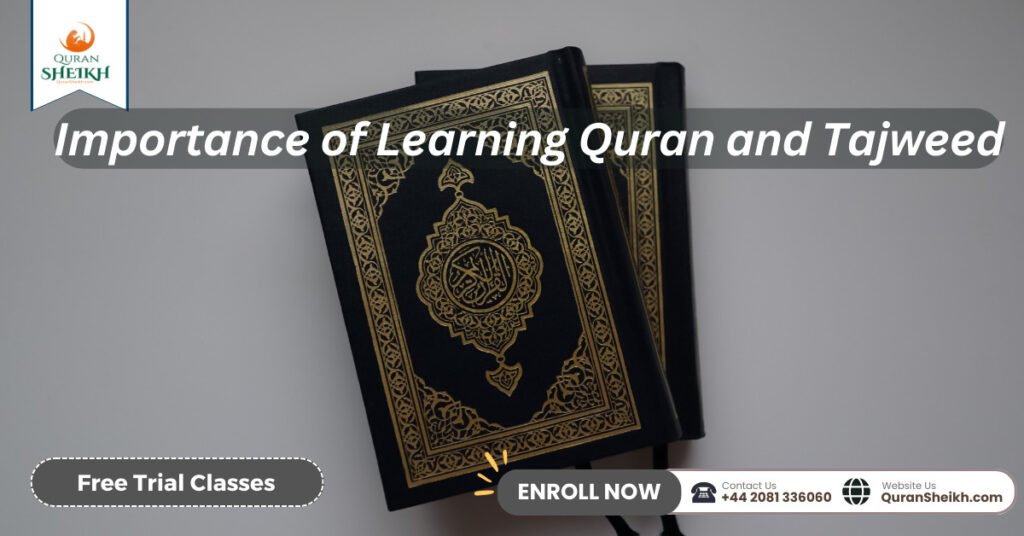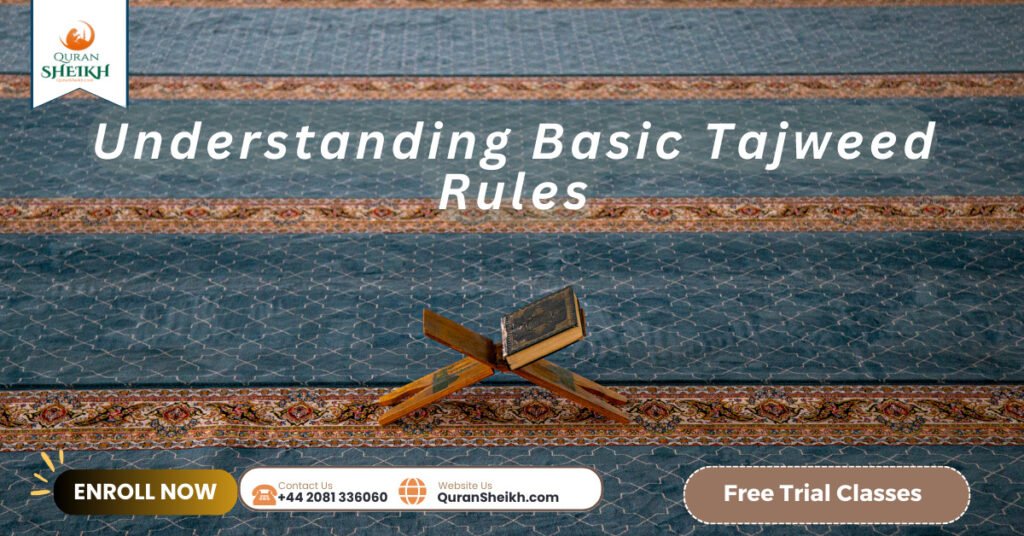Mastering Quran and Tajweed is at the core of Islam and a significant element in a Muslim’s life. Tajweed is an art that entails reading the holy book in the correct manner. This can offer a lot of advantages such as having spiritual bonding with ALLAH, mental development and good character formation.
The article looks into the basics of Quran and tajweed, explains why you need to study this, provides tips for improving these skills and finally, talks about the rewards for this spiritual journey.
This article is very useful for any novice, as well as experienced students of the Quran and Tajweed.
Join thousands of Muslim Families who love learning Quran, Arabic and Islamic Studies from the comfort of their Homes.
Introduction to learn Quran and Tajweed

Millions of Muslims strive to obtain accurate recitations of the correct Quran all over the world, hence this issue is significant. Every Muslim must learn tajweed which is an art with regard to proficiently reading the Al-Quran. Before one can comprehend the meaning of Tajweed, they should know what Tajweed refers to as well as understand the nature of the Quran.
What is Quran?
For Muslims, the Quran is holy, because it is the word of Allah that was sent down in the form of revelations revealed to Prophet Muhammad (May Allah’s peace and blessing be upon him) by Angle Gibrail. It is important because it contains Islamic faith, rules, and Islamic practices and therefore Muslims rely on it for guidance.
What is Tajweed?
Tajweed is a term used to refer to the rules governing the pronunciation of Arabic words, especially when applied to words contained in the Quran. Every person who wants to read Qur’an should master the art of Tajweed.
Importance of Learning Quran and Tajweed

Several benefits are associated with learning the Quran and perfecting it through tajweed.
Religious Significance
The Quran is the basic faith for Muslims as well as their main guidance. Quran and tajweed help in understanding true meaning of Islam which enables Muslims live in this world according to its teachings.
Spiritual Benefits
The recitation of Quran with Tajweed is an act of worship that brings Muslims closer to Allah, enabling them to experience inner calm and serenity. It is commonly held that one’s faith gets stronger when he recites the Quran with Tajweed.
Intellectual Development
The Memorizing while learning Quran and Tajweed increases cognitive functions and improves short term memory retention. This also empowers Arabic knowledge in Muslim since Arabic has been considered important in many spheres of living.
Quran Memorization Course Online with an Arab teacher with 30% Off
Understanding Basic Tajweed Rules

Before reciting the Quran with tajweed one has to understand how it should be pronounced as there are several laws governing the same. The rules are categorized into several groupings which include; Makharij ul Huroof, Sifaat ul Huroof, and Tajweed of Huroof e Maddah and Leen.
Makharij ul Huroof
Makharij ul Huroof denotes the correct pronunciation and articulation of each letter in the Arabic language. Every single letter is supposed to come out from particular points (makhraj) in the mouth and throat accurately.
Sifaat ul Huroof
This characteristic is known as sifaat ul huroof which involve the features of the letters such as the length, strength and pronunciation. Comprehension of these traits is indispensable when reciting the Quran with excellent Tajweed.
Tajweed of Haroof e Maddah and Leen
These letters are referred as Haroof e Maddah and Leen in which their length is prolonged, and the sound is muffled. Proper lengthening and softer pronunciation of these letters is crucial according to tajweed stipulations so that they can be recited accurately.
Techniques for Memorizing Quran
It can be quite demanding for one to memorize the Quran. However, this task does bring satisfaction and reward. Various methods as well as tools are helpful when it comes to memorization.
Understanding the Method of Memorization
Learning and memorizing of the Quran should be systematic, including repetition, revision, and comprehension. Memorization should be broken into several parts that can be reviewed from time to time in order to improve retention.
Memorization Aids and Tools
Some of the ways or tools that may help in the memorization processes include audio recordings, visual aids, or even mobile apps. The resources will enable learners to monitor their improvement and offer additional assistance while memorizing.
Reciting Quran with Correct Tajweed
Tajweed refers to the series of regulations for correctly pronouncing the various words and phrases of the Quran. It is critical for a person that seeks to read the Quran correctly. As a result, the rules of Tajweed allow reading with appropriate melody and rhythm, thereby enabling proper understanding while reading and not missing any word or letter. It brings the recitation of the Quran from mere reading to a beautiful and spiritual moment.
Tajweed Applied to Different Surahs
Surahs of Quran are subjected to the application of tajweed. As an illustration, the regulations of reciting Surah Al-Fatiha are not equivalent with those of Surah Al-Kahf. There are some general rules that should be learned when reciting a surah and there are specific rules too. Proper grasp of Tajweed means one would be reading the Quran well and reverently.
Tajweed Rules for Rhythm and Melody
The concept of Tajweed also includes special rules regarding rhythm and tune. In this regard, these rules control the pace of recitation, the manner in which the voice should vary up and down, and where it must place emphasis upon some words and letters than others. Knowing these rules makes the recitation even more beautiful and wonderful, making one be closer to Allah’s Word.
Common Errors to Avoid in Tajweed
When one is reciting Quran it is easier to commit errors especially on Tajweed. Here are some common mistakes to avoid:
Issues with Pronunciation and Articulation
The most common mistake which occurs in Tajweed is that words are not pronounced properly. Therefore, it might lead to misinterpretation of the meaning of a particular clause or a verse. Attention to proper articulation and pronunciation could prevent such mistakes.
Common Mispronunciations
An emphasis that is too strong or not applied at an appropriate point can lead to commonly mispronounced words or vowel sounds.
The other common mistake is that of adding an extra sound or syllable to a particular word. This will enable one to learn correct pronunciation, and articulation of each word to avoid such missteps.
Guidelines on How to Practice and Improve on Tajweed
Consistent practice is essential in learning of tajweed. Here are some tips to help you practice and perfect Tajweed:
Importance of Regular Practice
Tajweed is only mastered by practice. Practice on a daily basis helps in enhancing the quality of the recitation with reference to pronunciation, articulation, rhythm and melody. Consistency is the main aspect of perfecting tajweed.
Support of a qualified teacher
However, it would be worth pointing out that Tajweed cannot be learnt on its own; only with a competent instructor who offers guidance and supervision along the way would make this process really unique. a good teacher should be able to correct any mistake, provide relevant feedback for improvement and motivate students. Additionally, practicing in smaller groups further enhances motivation.
The advantages of learning Quran and tajweed
Learning Quran and Tajweed is beneficial in many ways. Here are some of them:
Spiritual and Emotional Benefits
Such learning of Quran and tajweed has various spiritual/emotional implications. One can achieve a relaxed atmosphere by reciting the Quran while the experience may be more enjoyable when one is fluent in tajweed. In addition, Muslims might be able to strengthen their links with Allah as well as improve their knowledge of Islam.
Intellectual and Cognitive Benefits
Moreover, learning the Quran and Tajweed may produce cognition and mental rewards as well. It boosts memory, concentration and reasoning abilities. Apart, studying Quran can help develop pathways within the brain with improved cognitive abilities.
Community and Social Benefits
Lastly, learning Qur’an and Tajweed is useful at the levels of the community and the society too. It provides an experience of home environment, promotes communal interactions and facilitates different social events.
Sharing the Quran learning and reciting can be helpful in building bonds while creating a good atmosphere. This is capable of fostering our spiritual, intellectual, and personal development. Learning Quran and Tajweed is a life-time journey. Therefore, if we apply tajweed with precision, we shall draw close to Allah and learn many aspects of the Quran.
Mastery of an art requires regular practice, tutoring by experts and life-long pursuit for knowledge. We hope that this article has encouraged you not to give up on Quranic and Tajweed education, which will have established a firm ground for future study.
What is the virtue of learning of Quran?
The learning of Quran is an act of great worship unto Allah because Quran is a word of God. There exist many advantages of acquiring knowledge about the Quran, either in this life or on the other side of death.
Furthermore, among the best virtues of learning the Quran is gaining more insight on the way and what Allah wants us to learn. There is no book that contains more information on the qualities of Allah and His Attributes, His names and His creation than this book, which is the Quran. There are instructions on how one should lead a good morally upright life.
The third virtue of knowing the Quran is enhancing our character. Quran instructs us to be kind, merciful and forgivable. Apart from that, it instructs us in truth-telling, honesty, fairness among other things. By learning Quran, we could be good persons and give our life more meaning.
Apart from the spiritual values of learning Quran, it has also got practical applications. For instance, it could enhance our reading and writing skills. We are also able to use it as a tool when learning Arabian, just like most people who are Muslim and need to learn Arabic for the Quran. Another way learning the Quran can benefit us is by teaching it to other people as well as getting a job which pertains to Islam.
In general, it is a high recommended form of worship with many blessings. It provides guidance and knowledge, enhances character, and has many practical advantages. It would also be advisable for you to make an attempt to learn how to read Quran. This is indeed one of those gifts that never stop giving out.
What will happen if you recite Quran without tajweed?
Tajweed is the science of correct recitation of the Quran in accordance with the rules of pronunciation and articulation. Although not obligatory, reading the Quran with Tajweed should be encouraged if possible since it preserves the meaning of the Quran and makes learning it easy.
It is possible in the course of reading the Quran without Tajweed that you would pronounce some words incorrectly thereby changing the meaning of the Quran according to what suits your understanding or opinion. Such might cause confusion which may lead to misinterpretation that would amount to violating the Quran.
Similarly, reading Quran using the Tajweed technique constitutes an act of worship. This shows the respect you have for the Quran and the delight from Allah. Also, reading the Quran with Tajweed is an example of following the Prophet (pbuh).
Here are some of the benefits of reading the Quran with Tajweed:
- It serves in maintaining the purity and integrity of its context as stated in the Quran.
- It helps in understanding the Quran.
- It is a way of worshipping.
- This could be as a sign of respect towards the Quran.
- It is an act that can attract the pleasure of Allah.
Fortunately, if you have never heard of Tajweed, there is much that you can read and learn about this principle. There are a variety of books, web sites and even software applications that can help beginner students learn Tajweed. After learning the basic rules of the Arabic language, you should begin learning how to read Quran with Tajweed.
Hence, learning to apply Tajweed and reading from the Quran in Tajweed is very significant. It will assist you maintain the meaning of Qur’an, to understand it easy, and worship Allah the way that He loves.
How do I get better at Tajweed?
Tajweed denotes the ability to recite any part of the Quran correctly and beautifully. Tajweed is a complicated subject but one can master it through practice and commitment.
Here are some tips:
- Get the basic rules of Tajweed. These cover the various categories of letters, how they are pronounced, and the Tajweed regulations. You can find numerous books on Tajweed available either in most public libraries or online.
- Listen to recordings of good Qur’an reciters with appropriate Tajweed. Listen to how they say each letter and follow proper Tajweed practice. Do your best to copy after them.
- Daily practice of reading the Quran. In order to improve Tajweed, keep on practicing until you perfect it. However, you should allocate some minutes daily for recitation of this holy book regardless of the nature of job you are engaged in.
- Seek an informed opinion and guidance on the Tajweed rules from a certified Tajweed teacher; the teacher can assist you in knowing where you are weak so that he/she gives you the necessary tips on improving.
- Be patient and persistent. Improving your Tajweed is not an easy task, you have to practice diligently and take your time. Do not despair if the results are not immediate. Practice makes perfect so just do your best.
Here is a bonus tip: make Tajweed fun! One can make learning of Tajweed fun by reciting together with friends, listening to professional Quran readers who have good voices, or participating in Tajweed competition. People do better at something when enjoying themselves rather than being bored and forced to put up with it.
I hope, these tips will assist you towards perfecting your Tajweed.
Best Quran memorization program with qualified Arab tutors and get 30% OFF, Quran classes for Kids
FAQ
What is the best way to start learning Quran and Tajweed?
It is advisable to seek an efficient tutor who can guide you on the fundamentals of correct Quran reciting and the Tajweed principles. In addition, there are reliable online platforms which provide self-paced courses as well as practice exercises.
Is it necessary for me to memorize the whole Quran in order to master Tajweed?
One does not have to memorize all the Quran, if one learns its recitation correctly. However, you must memorize at least two or three chapters of the Quran so that you can see its rhythmic as well as pronunciation aspects.
Is it necessary to learn Arabic to learn Tajweed?
Though not mandatory in Tajweed, a little comprehension of the Arabic language would help one understand some aspects of Tajweed principles. On the other hand, there are numerous translation and transliteration books that can assist in educating non-Arabs on Tajweed.
How long does it take to master Tajweed?
The art of mastering Tajweed is something that calls for an ongoing effort, one which is facilitated by professional instructors. Learning and acquiring proficiency in this subject is a personal matter depending on one’s degree of commitment, regularity of practice as a learner. It is important to be consistent, committed and patient while practicing.


